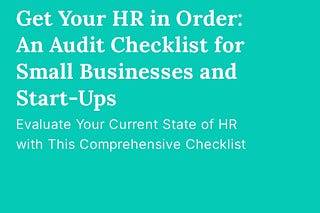

Discover more from Kristin Mueller - HR Freelancer
Where Start-ups and Scale-ups Have it Wrong
In my experience, start-ups and scale-ups are missing one significant element to their company. Whether it’s a start-up that is still validating a product and searching for a scalable business model or a scale-up that has validated their assumption by proving that their product is economically sustainable, both overlook the importance of HR operations, resulting in a lack of focus in its founders, inefficiencies, and increased overhead costs.
In my last post, I talked about taking a break from the feverish “hustle” to be more present. I’ve redefined what brings me purpose and fulfillment in my personal and professional life. It’s been a fantastic several months. After connecting with old colleagues, mentors, and leaders in the industry, I recognized a gap within start-ups and scale-ups where resources are often improperly utilized, mismanaged, and lacking a solid foundation for when companies are ready to scale.
I’ll share the problems I’ve seen when incorporating HR operations into early-stage companies and how it can become more of a distraction than a viable, scalable solution.
The Problem
Many start-ups often have very few systems in place, and the process someone follows will look different every time. As start-ups transition into scale-ups, organized systems become more imperative to engage with investors, maintain credibility, and ensure data accuracy and consistency. It is difficult for most founders and senior leaders to recognize the value and impact HR has on their company, yet they understand that it’s part of running a business.
To “get by” for as long as they possibly can, companies do one of three things:
Hire a junior team member to manage HR.
Hire an Office Manager who oversees all administration.
The CEO attempts to address HR needs as they arise.
In most cases, these are neither scalable solutions nor money well spent. Let me tell you why;
I will start by saying that I am a HUGE advocate for hiring junior professionals and providing an opportunity for growth and development. Hiring a junior HR professional can be a win-win when actively managed as it’s affordable and they're eager to learn and grow professionally. By nature, team members have the freedom to experiment with various processes until they figure out improvements. Eventually, when the business grows, these processes need to be replicated and scalable, and that's when issues make their way to the surface. Here is where I most often notice discrepancies, missing data, and non-compliance.
Now, remember, this is not something we can fault the team member for. We have all started somewhere, but it also takes active guidance and mentorship; a CEO is certainly not one to provide this. Initially, the founding team has the best intentions, but in reality, unrelated challenges will always arise, shifting their focus to something more pressing.
Something else I frequently see is an Office Manager who does it all. During the early stages of company growth, team members are hired for specific skills but must take on additional challenges outside of their realm of expertise. Companies rely on the “Jack or Jill of all trades” to develop strategies, systems, and processes. An Office Manager is responsible for HR and Finance. Again, an excellent opportunity for someone to learn and grow in their career, but not very effective when they have had little exposure to establishing a solid foundation. It’s a resourceful option, but the long-term impact will come to light when the company is ready to scale. Scale-ups will find that processes and workflows are not scalable, companies are not in compliance, and make-shift solutions have been put in place to keep balls in the air. To no fault of the team member, but we humans don’t know what we don’t know, and in a start-up environment, you make it happen.
Then, of course, there is the CEO who prefers to manage HR until they realize it's too much. I’m not sure I need to highlight much, but this option is neither scalable nor efficient! When it comes to focusing time and energy, a CEO’s time is better utilized, not worrying about all the administrative tasks, instead of focusing on product development and fundraising.
And then, there is the option to hire a senior HR professional right off the bat—someone who has experience working for start-ups and establishing an HR function. I’m a fan of this option as it demonstrates to the business, investors, and the team that this is an essential function of the company. It’s not an after-thought; HR is a strategic partner to the business. That’s great! But beware, hiring a senior professional too soon may leave them disengaged due to a lack of meaningful work and assisting with numerous administrative tasks outside of their scope. Now, while I genuinely believe that this is part of working for a start-up, companies are underutilizing their talent and overpaying for the work they’re performing. There may come a time when policies and programs have been established, the business itself is ready to scale, but the product isn’t there. Scaling smartly is vital; if a company is still discovering or validating its product, it’s likely too soon to hire a senior professional.
I’m sure you’re wondering how this problem can get addressed...
Outsourcing HR operations and administration to an HR Freelancer is a viable and cost-effective solution. Scaling up doesn’t require revolutionary action; instead, it requires standardized business processes early on so companies can take on bigger workloads without losing momentum. The more experienced and qualified the team in establishing business processes, and overseeing metrics and procedures, the more effective founders and leaders can be in scaling the company to more significant potential, focusing on fundraising and revenue.
In my upcoming blog post, I will be sharing more on the HR Freelancer concept, the value of HR Freelance, and how it’s the most efficient and cost-effective solution for start-ups and scale-ups.
📷: Photo by Startaê Team on Unsplash
Subscribe to Kristin Mueller - HR Freelancer
Providing tailored HR support for growing teams.









